Suppose you have an custom RequireRoleViewAttribute:
[AttributeUsageAttribute(AttributeTargets.All, Inherited = true, AllowMultiple = true)]
public class RequireRoleViewAttribute : Attribute
{
public string Role;
public RequireRoleViewAttribute(string role){
this.Role = role;
}
}
How can I pass values that are based on the request to this resolver?
You can have a IServiceProvider injected in your custom resolver :
public class RoleBasedContractResolver : DefaultContractResolver
{
public IServiceProvider ServiceProvider { get; }
public RoleBasedContractResolver( IServiceProvider sp)
{
this.ServiceProvider = sp;
}
protected override JsonProperty CreateProperty(MemberInfo member, MemberSerialization memberSerialization)
{
var contextAccessor = this.ServiceProvider.GetRequiredService<IHttpContextAccessor>() ;
var context = contextAccessor.HttpContext;
var user = context.User;
// if you're using the Identity, you can get the userManager :
var userManager = context.RequestServices.GetRequiredService<UserManager<IdentityUser>>();
// ...
}
}
thus we can get the HttpContext and User as we like. If you're using the Identity, you can also get the UserManager service and roles.
and now we can follow @dbc's advice to control the ShouldSerialize:
protected override JsonProperty CreateProperty(MemberInfo member, MemberSerialization memberSerialization)
{
var contextAccessor = this.ServiceProvider.GetRequiredService<IHttpContextAccessor>() ;
var context = contextAccessor.HttpContext;
var user = context.User;
// if you use the Identitiy, you can get the usermanager
//UserManager<IdentityUser>
var userManager = context.RequestServices.GetRequiredService<UserManager<IdentityUser>>();
JsonProperty property = base.CreateProperty(member, memberSerialization);
// get the attributes
var attrs=member.GetCustomAttributes<RequireRoleViewAttribute>();
// if no [RequireResoveView] decorated, always serialize it
if(attrs.Count()==0) {
property.ShouldDeserialize = instance => true;
return property;
}
// custom your logic to dertermine wether should serialize the property
// I just use check if it can statisify any the condition :
var roles = this.GetIdentityUserRolesAsync(context,userManager).Result;
property.ShouldSerialize = instance => {
var resource = new { /* any you need */ };
return attrs.Any(attr => {
var rolename = attr.Role;
return roles.Any(r => r == rolename ) ;
}) ? true : false;
};
return property;
}
The function GetIdentityUserRolesAsync here is helper method to retrieve roles using the current HttpContext and the UserManger service :
private async Task<IList<string>> GetIdentityUserRolesAsync(HttpContext context, UserManager<IdentityUser> userManager)
{
var rolesCached= context.Items["__userRoles__"];
if( rolesCached != null){
return (IList<string>) rolesCached;
}
var identityUser = await userManager.GetUserAsync(context.User);
var roles = await userManager.GetRolesAsync(identityUser);
context.Items["__userRoles__"] = roles;
return roles;
}
How to inject the IServiceProvider in details :
The trick is all about how to configure the default MvcJwtOptions with an IServiceProvider.
Don't configure the JsonOptions by :
services.AddMvc().
.AddJsonOptions(o =>{
// o.
});
as it doesn't allow us add a IServiceProvider parameter.
We can custom a subclass of MvcJsonOptions:
// in .NET 3.1 and above, change this from MvcJsonOptions to MvcNewtonsoftJsonOptions
public class MyMvcJsonOptionsWrapper : IConfigureOptions<MvcJsonOptions>
{
IServiceProvider ServiceProvider;
public MyMvcJsonOptionsWrapper(IServiceProvider serviceProvider)
{
this.ServiceProvider = serviceProvider;
}
public void Configure(MvcJsonOptions options)
{
options.SerializerSettings.ContractResolver =new RoleBasedContractResolver(ServiceProvider);
}
}
and register the services by :
services.TryAddSingleton<IHttpContextAccessor, HttpContextAccessor>();
// don't forget to add the IHttpContextAccessor
// in .NET 3.1 and above, change this from MvcJsonOptions to MvcNewtonsoftJsonOptions
services.AddTransient<IConfigureOptions<MvcJsonOptions>,MyMvcJsonOptionsWrapper>();
Test Case :
Let's say you have a custom POCO :
public class TestObject
{
public string Field1 => "NoRestrictions";
[RequireRoleView("Admin")]
public string Field2 => "ViewRequiresAdmin";
[RequireRoleView("HR"),RequireRoleView("OP")]
public string Field3 => "ViewRequiresHROrOP";
[RequireRoleView("IT"), RequireRoleView("HR")]
public string Field4 => "ViewRequiresITOrHR";
[RequireRoleView("IT"), RequireRoleView("OP")]
public string Field5 => "ViewRequiresITOrOP";
}
And the Current User has roles : Admin and HR:
The result will be :
{"Field1":"NoRestrictions","Field2":"ViewRequiresAdmin","Field3":"ViewRequiresHROrOP","Field4":"ViewRequiresITOrHR"}
A screenshot of testing with an action method :

